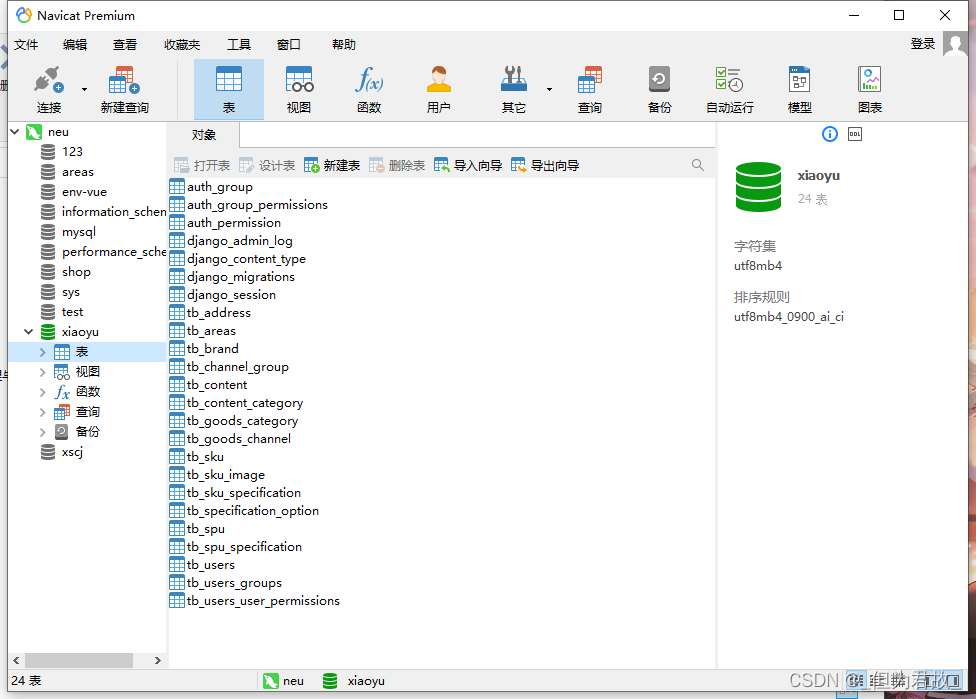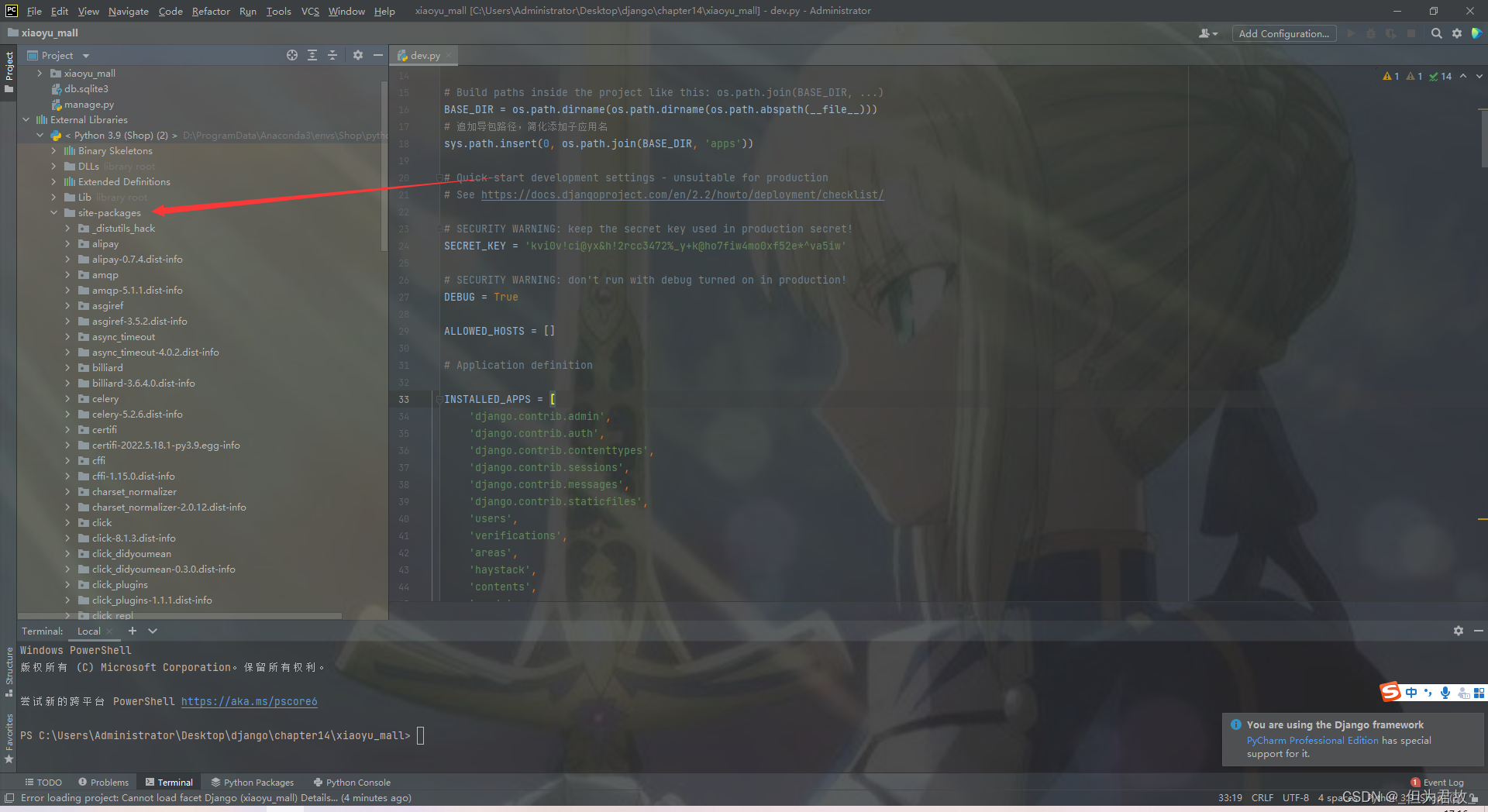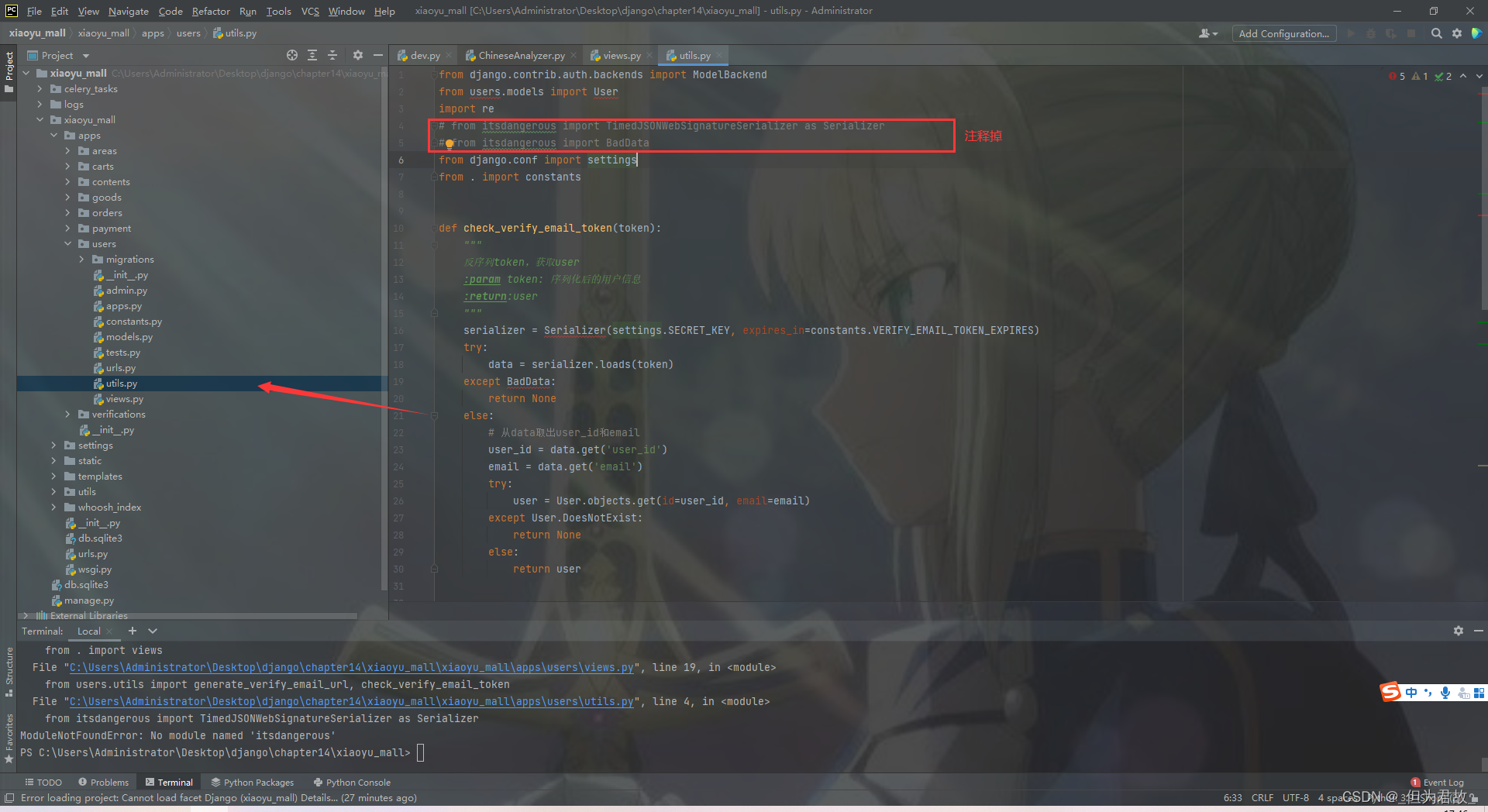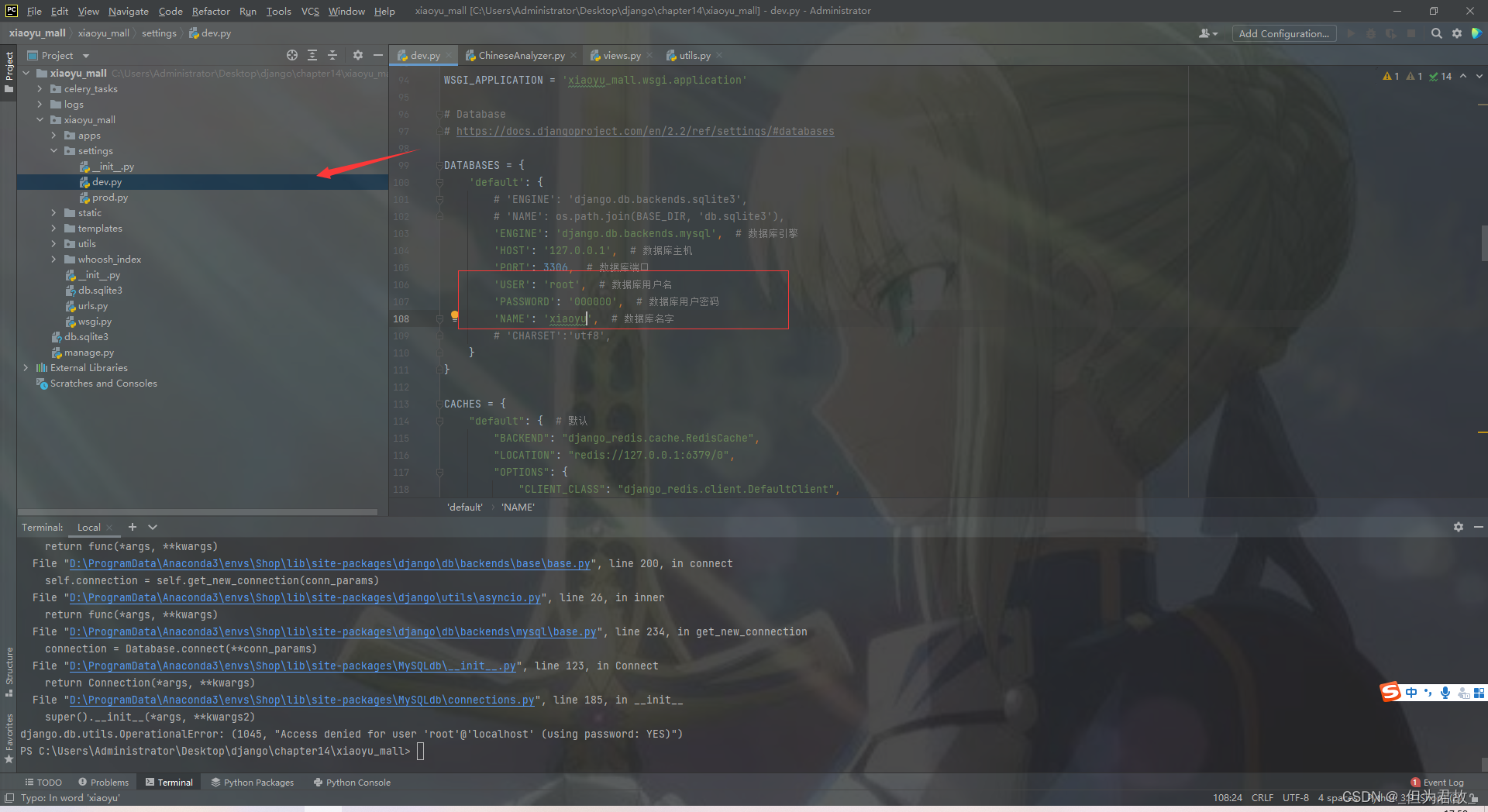项目代码:chapter14、 xiaoyu.sql
我使用的环境:python3.9、django3.2.5
如果还是有其他报错或者bug,把报错截图发给我我给我
1、创建数据库xiaoyu,运行sql文件,刷新


2.把项目文件拖到pycharm中打开

3.将ChineseAnalyzer.py与whoosh_cn_backend.py复制到 site-packages.haystack.backends中,重启pycharm
ChineseAnalyzer.py
import jieba
from whoosh.analysis import Tokenizer, Token
class ChineseTokenizer(Tokenizer):
def __call__(self, value, positions=False, chars=False,
keeporiginal=False, removestops=True,
start_pos=0, start_char=0, mode='', **kwargs):
t = Token(positions, chars, removestops=removestops, mode=mode,**kwargs)
seglist = jieba.cut(value, cut_all=True)
for w in seglist:
t.original = t.text = w
t.boost = 1.0
if positions:
t.pos = start_pos + value.find(w)
if chars:
t.startchar = start_char + value.find(w)
t.endchar = start_char + value.find(w) + len(w)
yield t
def ChineseAnalyzer():
return ChineseTokenizer()whoosh_cn_backend.py
from __future__ import absolute_import, division, print_function, unicode_literals
from .ChineseAnalyzer import ChineseAnalyzer
import json
import os
import re
import shutil
import threading
import warnings
from django.conf import settings
from django.core.exceptions import ImproperlyConfigured
from django.utils.datetime_safe import date, datetime
from django.utils.encoding import force_str
from haystack.backends import (
BaseEngine,
BaseSearchBackend,
BaseSearchQuery,
EmptyResults,
log_query,
)
from haystack.constants import (
DJANGO_CT,
DJANGO_ID,
FUZZY_WHOOSH_MAX_EDITS,
FUZZY_WHOOSH_MIN_PREFIX,
ID,
)
from haystack.exceptions import MissingDependency, SearchBackendError, SkipDocument
from haystack.inputs import Clean, Exact, PythonData, Raw
from haystack.models import SearchResult
from haystack.utils import get_identifier, get_model_ct
from haystack.utils import log as logging
from haystack.utils.app_loading import haystack_get_model
try:
import whoosh
except ImportError:
raise MissingDependency(
"The 'whoosh' backend requires the installation of 'Whoosh'. Please refer to the documentation."
)
# Handle minimum requirement.
if not hasattr(whoosh, "__version__") or whoosh.__version__ < (2, 5, 0):
raise MissingDependency("The 'whoosh' backend requires version 2.5.0 or greater.")
# Bubble up the correct error.
from whoosh import index
from whoosh.analysis import StemmingAnalyzer
from whoosh.fields import BOOLEAN, DATETIME
from whoosh.fields import ID as WHOOSH_ID
from whoosh.fields import IDLIST, KEYWORD, NGRAM, NGRAMWORDS, NUMERIC, TEXT, Schema
from whoosh.filedb.filestore import FileStorage, RamStorage
from whoosh.highlight import ContextFragmenter, HtmlFormatter
from whoosh.highlight import highlight as whoosh_highlight
from whoosh.qparser import FuzzyTermPlugin, QueryParser
from whoosh.searching import ResultsPage
from whoosh.sorting import Count, DateRangeFacet, FieldFacet
from whoosh.support.relativedelta import relativedelta as RelativeDelta
from whoosh.writing import AsyncWriter
DATETIME_REGEX = re.compile(
r"^(?P<year>\d{4})-(?P<month>\d{2})-(?P<day>\d{2})T(?P<hour>\d{2}):(?P<minute>\d{2}):(?P<second>\d{2})(\.\d{3,6}Z?)?$"
)
LOCALS = threading.local()
LOCALS.RAM_STORE = None
class WhooshHtmlFormatter(HtmlFormatter):
"""
This is a HtmlFormatter simpler than the whoosh.HtmlFormatter.
We use it to have consistent results across backends. Specifically,
Solr, Xapian and Elasticsearch are using this formatting.
"""
template = "<%(tag)s>%(t)s</%(tag)s>"
class WhooshSearchBackend(BaseSearchBackend):
# Word reserved by Whoosh for special use.
RESERVED_WORDS = ("AND", "NOT", "OR", "TO")
# Characters reserved by Whoosh for special use.
# The '\\' must come first, so as not to overwrite the other slash replacements.
RESERVED_CHARACTERS = (
"\\",
"+",
"-",
"&&",
"||",
"!",
"(",
")",
"{",
"}",
"[",
"]",
"^",
'"',
"~",
"*",
"?",
":",
".",
)
def __init__(self, connection_alias, **connection_options):
super().__init__(connection_alias, **connection_options)
self.setup_complete = False
self.use_file_storage = True
self.post_limit = getattr(connection_options, "POST_LIMIT", 128 * 1024 * 1024)
self.path = connection_options.get("PATH")
if connection_options.get("STORAGE", "file") != "file":
self.use_file_storage = False
if self.use_file_storage and not self.path:
raise ImproperlyConfigured(
"You must specify a 'PATH' in your settings for connection '%s'."
% connection_alias
)
self.log = logging.getLogger("haystack")
def setup(self):
"""
Defers loading until needed.
"""
from haystack import connections
new_index = False
# Make sure the index is there.
if self.use_file_storage and not os.path.exists(self.path):
os.makedirs(self.path)
new_index = True
if self.use_file_storage and not os.access(self.path, os.W_OK):
raise IOError(
"The path to your Whoosh index '%s' is not writable for the current user/group."
% self.path
)
if self.use_file_storage:
self.storage = FileStorage(self.path)
else:
global LOCALS
if getattr(LOCALS, "RAM_STORE", None) is None:
LOCALS.RAM_STORE = RamStorage()
self.storage = LOCALS.RAM_STORE
self.content_field_name, self.schema = self.build_schema(
connections[self.connection_alias].get_unified_index().all_searchfields()
)
self.parser = QueryParser(self.content_field_name, schema=self.schema)
self.parser.add_plugins([FuzzyTermPlugin])
if new_index is True:
self.index = self.storage.create_index(self.schema)
else:
try:
self.index = self.storage.open_index(schema=self.schema)
except index.EmptyIndexError:
self.index = self.storage.create_index(self.schema)
self.setup_complete = True
def build_schema(self, fields):
schema_fields = {
ID: WHOOSH_ID(stored=True, unique=True),
DJANGO_CT: WHOOSH_ID(stored=True),
DJANGO_ID: WHOOSH_ID(stored=True),
}
# Grab the number of keys that are hard-coded into Haystack.
# We'll use this to (possibly) fail slightly more gracefully later.
initial_key_count = len(schema_fields)
content_field_name = ""
for _, field_class in fields.items():
if field_class.is_multivalued:
if field_class.indexed is False:
schema_fields[field_class.index_fieldname] = IDLIST(
stored=True, field_boost=field_class.boost
)
else:
schema_fields[field_class.index_fieldname] = KEYWORD(
stored=True,
commas=True,
scorable=True,
field_boost=field_class.boost,
)
elif field_class.field_type in ["date", "datetime"]:
schema_fields[field_class.index_fieldname] = DATETIME(
stored=field_class.stored, sortable=True
)
elif field_class.field_type == "integer":
schema_fields[field_class.index_fieldname] = NUMERIC(
stored=field_class.stored,
numtype=int,
field_boost=field_class.boost,
)
elif field_class.field_type == "float":
schema_fields[field_class.index_fieldname] = NUMERIC(
stored=field_class.stored,
numtype=float,
field_boost=field_class.boost,
)
elif field_class.field_type == "boolean":
# Field boost isn't supported on BOOLEAN as of 1.8.2.
schema_fields[field_class.index_fieldname] = BOOLEAN(
stored=field_class.stored
)
elif field_class.field_type == "ngram":
schema_fields[field_class.index_fieldname] = NGRAM(
minsize=3,
maxsize=15,
stored=field_class.stored,
field_boost=field_class.boost,
)
elif field_class.field_type == "edge_ngram":
schema_fields[field_class.index_fieldname] = NGRAMWORDS(
minsize=2,
maxsize=15,
at="start",
stored=field_class.stored,
field_boost=field_class.boost,
)
else:
schema_fields[field_class.index_fieldname] = TEXT(
stored=True,
analyzer=ChineseAnalyzer(),
field_boost=field_class.boost,
sortable=True,
)
if field_class.document is True:
content_field_name = field_class.index_fieldname
schema_fields[field_class.index_fieldname].spelling = True
# Fail more gracefully than relying on the backend to die if no fields
# are found.
if len(schema_fields) <= initial_key_count:
raise SearchBackendError(
"No fields were found in any search_indexes. Please correct this before attempting to search."
)
return (content_field_name, Schema(**schema_fields))
def update(self, index, iterable, commit=True):
if not self.setup_complete:
self.setup()
self.index = self.index.refresh()
writer = AsyncWriter(self.index)
for obj in iterable:
try:
doc = index.full_prepare(obj)
except SkipDocument:
self.log.debug("Indexing for object `%s` skipped", obj)
else:
# Really make sure it's unicode, because Whoosh won't have it any
# other way.
for key in doc:
doc[key] = self._from_python(doc[key])
# Document boosts aren't supported in Whoosh 2.5.0+.
if "boost" in doc:
del doc["boost"]
try:
writer.update_document(**doc)
except Exception as e:
if not self.silently_fail:
raise
# We'll log the object identifier but won't include the actual object
# to avoid the possibility of that generating encoding errors while
# processing the log message:
self.log.error(
"%s while preparing object for update" % e.__class__.__name__,
exc_info=True,
extra={"data": {"index": index, "object": get_identifier(obj)}},
)
if len(iterable) > 0:
# For now, commit no matter what, as we run into locking issues otherwise.
writer.commit()
if writer.ident is not None:
writer.join()
def remove(self, obj_or_string, commit=True):
if not self.setup_complete:
self.setup()
self.index = self.index.refresh()
whoosh_id = get_identifier(obj_or_string)
try:
self.index.delete_by_query(q=self.parser.parse('%s:"%s"' % (ID, whoosh_id)))
except Exception as e:
if not self.silently_fail:
raise
self.log.error(
"Failed to remove document '%s' from Whoosh: %s",
whoosh_id,
e,
exc_info=True,
)
def clear(self, models=None, commit=True):
if not self.setup_complete:
self.setup()
self.index = self.index.refresh()
if models is not None:
assert isinstance(models, (list, tuple))
try:
if models is None:
self.delete_index()
else:
models_to_delete = []
for model in models:
models_to_delete.append("%s:%s" % (DJANGO_CT, get_model_ct(model)))
self.index.delete_by_query(
q=self.parser.parse(" OR ".join(models_to_delete))
)
except Exception as e:
if not self.silently_fail:
raise
if models is not None:
self.log.error(
"Failed to clear Whoosh index of models '%s': %s",
",".join(models_to_delete),
e,
exc_info=True,
)
else:
self.log.error("Failed to clear Whoosh index: %s", e, exc_info=True)
def delete_index(self):
# Per the Whoosh mailing list, if wiping out everything from the index,
# it's much more efficient to simply delete the index files.
if self.use_file_storage and os.path.exists(self.path):
shutil.rmtree(self.path)
elif not self.use_file_storage:
self.storage.clean()
# Recreate everything.
self.setup()
def optimize(self):
if not self.setup_complete:
self.setup()
self.index = self.index.refresh()
self.index.optimize()
def calculate_page(self, start_offset=0, end_offset=None):
# Prevent against Whoosh throwing an error. Requires an end_offset
# greater than 0.
if end_offset is not None and end_offset <= 0:
end_offset = 1
# Determine the page.
page_num = 0
if end_offset is None:
end_offset = 1000000
if start_offset is None:
start_offset = 0
page_length = end_offset - start_offset
if page_length and page_length > 0:
page_num = int(start_offset / page_length)
# Increment because Whoosh uses 1-based page numbers.
page_num += 1
return page_num, page_length
@log_query
def search(
self,
query_string,
sort_by=None,
start_offset=0,
end_offset=None,
fields="",
highlight=False,
facets=None,
date_facets=None,
query_facets=None,
narrow_queries=None,
spelling_query=None,
within=None,
dwithin=None,
distance_point=None,
models=None,
limit_to_registered_models=None,
result_class=None,
**kwargs
):
if not self.setup_complete:
self.setup()
# A zero length query should return no results.
if len(query_string) == 0:
return {"results": [], "hits": 0}
query_string = force_str(query_string)
# A one-character query (non-wildcard) gets nabbed by a stopwords
# filter and should yield zero results.
if len(query_string) <= 1 and query_string != "*":
return {"results": [], "hits": 0}
reverse = False
if sort_by is not None:
# Determine if we need to reverse the results and if Whoosh can
# handle what it's being asked to sort by. Reversing is an
# all-or-nothing action, unfortunately.
sort_by_list = []
reverse_counter = 0
for order_by in sort_by:
if order_by.startswith("-"):
reverse_counter += 1
if reverse_counter and reverse_counter != len(sort_by):
raise SearchBackendError(
"Whoosh requires all order_by fields"
" to use the same sort direction"
)
for order_by in sort_by:
if order_by.startswith("-"):
sort_by_list.append(order_by[1:])
if len(sort_by_list) == 1:
reverse = True
else:
sort_by_list.append(order_by)
if len(sort_by_list) == 1:
reverse = False
sort_by = sort_by_list
group_by = []
facet_types = {}
if facets is not None:
group_by += [
FieldFacet(facet, allow_overlap=True, maptype=Count) for facet in facets
]
facet_types.update({facet: "fields" for facet in facets})
if date_facets is not None:
def _fixup_datetime(dt):
if isinstance(dt, datetime):
return dt
if isinstance(dt, date):
return datetime(dt.year, dt.month, dt.day)
raise ValueError
for key, value in date_facets.items():
start = _fixup_datetime(value["start_date"])
end = _fixup_datetime(value["end_date"])
gap_by = value["gap_by"]
gap_amount = value.get("gap_amount", 1)
gap = RelativeDelta(**{"%ss" % gap_by: gap_amount})
group_by.append(DateRangeFacet(key, start, end, gap, maptype=Count))
facet_types[key] = "dates"
if query_facets is not None:
warnings.warn(
"Whoosh does not handle query faceting.", Warning, stacklevel=2
)
narrowed_results = None
self.index = self.index.refresh()
if limit_to_registered_models is None:
limit_to_registered_models = getattr(
settings, "HAYSTACK_LIMIT_TO_REGISTERED_MODELS", True
)
if models and len(models):
model_choices = sorted(get_model_ct(model) for model in models)
elif limit_to_registered_models:
# Using narrow queries, limit the results to only models handled
# with the current routers.
model_choices = self.build_models_list()
else:
model_choices = []
if len(model_choices) > 0:
if narrow_queries is None:
narrow_queries = set()
narrow_queries.add(
" OR ".join(["%s:%s" % (DJANGO_CT, rm) for rm in model_choices])
)
narrow_searcher = None
if narrow_queries is not None:
# Potentially expensive? I don't see another way to do it in Whoosh...
narrow_searcher = self.index.searcher()
for nq in narrow_queries:
recent_narrowed_results = narrow_searcher.search(
self.parser.parse(force_str(nq)), limit=None
)
if len(recent_narrowed_results) <= 0:
return {"results": [], "hits": 0}
if narrowed_results is not None:
narrowed_results.filter(recent_narrowed_results)
else:
narrowed_results = recent_narrowed_results
self.index = self.index.refresh()
if self.index.doc_count():
searcher = self.index.searcher()
parsed_query = self.parser.parse(query_string)
# In the event of an invalid/stopworded query, recover gracefully.
if parsed_query is None:
return {"results": [], "hits": 0}
page_num, page_length = self.calculate_page(start_offset, end_offset)
search_kwargs = {
"pagelen": page_length,
"sortedby": sort_by,
"reverse": reverse,
"groupedby": group_by,
}
# Handle the case where the results have been narrowed.
if narrowed_results is not None:
search_kwargs["filter"] = narrowed_results
try:
raw_page = searcher.search_page(parsed_query, page_num, **search_kwargs)
except ValueError:
if not self.silently_fail:
raise
return {"results": [], "hits": 0, "spelling_suggestion": None}
# Because as of Whoosh 2.5.1, it will return the wrong page of
# results if you request something too high. :(
if raw_page.pagenum < page_num:
return {"results": [], "hits": 0, "spelling_suggestion": None}
results = self._process_results(
raw_page,
highlight=highlight,
query_string=query_string,
spelling_query=spelling_query,
result_class=result_class,
facet_types=facet_types,
)
searcher.close()
if hasattr(narrow_searcher, "close"):
narrow_searcher.close()
return results
else:
if self.include_spelling:
if spelling_query:
spelling_suggestion = self.create_spelling_suggestion(
spelling_query
)
else:
spelling_suggestion = self.create_spelling_suggestion(query_string)
else:
spelling_suggestion = None
return {
"results": [],
"hits": 0,
"spelling_suggestion": spelling_suggestion,
}
def more_like_this(
self,
model_instance,
additional_query_string=None,
start_offset=0,
end_offset=None,
models=None,
limit_to_registered_models=None,
result_class=None,
**kwargs
):
if not self.setup_complete:
self.setup()
field_name = self.content_field_name
narrow_queries = set()
narrowed_results = None
self.index = self.index.refresh()
if limit_to_registered_models is None:
limit_to_registered_models = getattr(
settings, "HAYSTACK_LIMIT_TO_REGISTERED_MODELS", True
)
if models and len(models):
model_choices = sorted(get_model_ct(model) for model in models)
elif limit_to_registered_models:
# Using narrow queries, limit the results to only models handled
# with the current routers.
model_choices = self.build_models_list()
else:
model_choices = []
if len(model_choices) > 0:
if narrow_queries is None:
narrow_queries = set()
narrow_queries.add(
" OR ".join(["%s:%s" % (DJANGO_CT, rm) for rm in model_choices])
)
if additional_query_string and additional_query_string != "*":
narrow_queries.add(additional_query_string)
narrow_searcher = None
if narrow_queries is not None:
# Potentially expensive? I don't see another way to do it in Whoosh...
narrow_searcher = self.index.searcher()
for nq in narrow_queries:
recent_narrowed_results = narrow_searcher.search(
self.parser.parse(force_str(nq)), limit=None
)
if len(recent_narrowed_results) <= 0:
return {"results": [], "hits": 0}
if narrowed_results:
narrowed_results.filter(recent_narrowed_results)
else:
narrowed_results = recent_narrowed_results
page_num, page_length = self.calculate_page(start_offset, end_offset)
self.index = self.index.refresh()
raw_results = EmptyResults()
searcher = None
if self.index.doc_count():
query = "%s:%s" % (ID, get_identifier(model_instance))
searcher = self.index.searcher()
parsed_query = self.parser.parse(query)
results = searcher.search(parsed_query)
if len(results):
raw_results = results[0].more_like_this(field_name, top=end_offset)
# Handle the case where the results have been narrowed.
if narrowed_results is not None and hasattr(raw_results, "filter"):
raw_results.filter(narrowed_results)
try:
raw_page = ResultsPage(raw_results, page_num, page_length)
except ValueError:
if not self.silently_fail:
raise
return {"results": [], "hits": 0, "spelling_suggestion": None}
# Because as of Whoosh 2.5.1, it will return the wrong page of
# results if you request something too high. :(
if raw_page.pagenum < page_num:
return {"results": [], "hits": 0, "spelling_suggestion": None}
results = self._process_results(raw_page, result_class=result_class)
if searcher:
searcher.close()
if hasattr(narrow_searcher, "close"):
narrow_searcher.close()
return results
def _process_results(
self,
raw_page,
highlight=False,
query_string="",
spelling_query=None,
result_class=None,
facet_types=None,
):
from haystack import connections
results = []
# It's important to grab the hits first before slicing. Otherwise, this
# can cause pagination failures.
hits = len(raw_page)
if result_class is None:
result_class = SearchResult
spelling_suggestion = None
unified_index = connections[self.connection_alias].get_unified_index()
indexed_models = unified_index.get_indexed_models()
facets = {}
if facet_types:
facets = {
"fields": {},
"dates": {},
"queries": {},
}
for facet_fieldname in raw_page.results.facet_names():
group = raw_page.results.groups(facet_fieldname)
facet_type = facet_types[facet_fieldname]
# Extract None item for later processing, if present.
none_item = group.pop(None, None)
lst = facets[facet_type][facet_fieldname] = sorted(
group.items(), key=(lambda itm: (-itm[1], itm[0]))
)
if none_item is not None:
# Inject None item back into the results.
none_entry = (None, none_item)
if not lst or lst[-1][1] >= none_item:
lst.append(none_entry)
else:
for i, value in enumerate(lst):
if value[1] < none_item:
lst.insert(i, none_entry)
break
for doc_offset, raw_result in enumerate(raw_page):
score = raw_page.score(doc_offset) or 0
app_label, model_name = raw_result[DJANGO_CT].split(".")
additional_fields = {}
model = haystack_get_model(app_label, model_name)
if model and model in indexed_models:
for key, value in raw_result.items():
index = unified_index.get_index(model)
string_key = str(key)
if string_key in index.fields and hasattr(
index.fields[string_key], "convert"
):
# Special-cased due to the nature of KEYWORD fields.
if index.fields[string_key].is_multivalued:
if value is None or len(value) == 0:
additional_fields[string_key] = []
else:
additional_fields[string_key] = value.split(",")
else:
additional_fields[string_key] = index.fields[
string_key
].convert(value)
else:
additional_fields[string_key] = self._to_python(value)
del additional_fields[DJANGO_CT]
del additional_fields[DJANGO_ID]
if highlight:
sa = StemmingAnalyzer()
formatter = WhooshHtmlFormatter("em")
terms = [token.text for token in sa(query_string)]
whoosh_result = whoosh_highlight(
additional_fields.get(self.content_field_name),
terms,
sa,
ContextFragmenter(),
formatter,
)
additional_fields["highlighted"] = {
self.content_field_name: [whoosh_result]
}
result = result_class(
app_label,
model_name,
raw_result[DJANGO_ID],
score,
**additional_fields
)
results.append(result)
else:
hits -= 1
if self.include_spelling:
if spelling_query:
spelling_suggestion = self.create_spelling_suggestion(spelling_query)
else:
spelling_suggestion = self.create_spelling_suggestion(query_string)
return {
"results": results,
"hits": hits,
"facets": facets,
"spelling_suggestion": spelling_suggestion,
}
def create_spelling_suggestion(self, query_string):
spelling_suggestion = None
reader = self.index.reader()
corrector = reader.corrector(self.content_field_name)
cleaned_query = force_str(query_string)
if not query_string:
return spelling_suggestion
# Clean the string.
for rev_word in self.RESERVED_WORDS:
cleaned_query = cleaned_query.replace(rev_word, "")
for rev_char in self.RESERVED_CHARACTERS:
cleaned_query = cleaned_query.replace(rev_char, "")
# Break it down.
query_words = cleaned_query.split()
suggested_words = []
for word in query_words:
suggestions = corrector.suggest(word, limit=1)
if len(suggestions) > 0:
suggested_words.append(suggestions[0])
spelling_suggestion = " ".join(suggested_words)
return spelling_suggestion
def _from_python(self, value):
"""
Converts Python values to a string for Whoosh.
Code courtesy of pysolr.
"""
if hasattr(value, "strftime"):
if not hasattr(value, "hour"):
value = datetime(value.year, value.month, value.day, 0, 0, 0)
elif isinstance(value, bool):
if value:
value = "true"
else:
value = "false"
elif isinstance(value, (list, tuple)):
value = ",".join([force_str(v) for v in value])
elif isinstance(value, (int, float)):
# Leave it alone.
pass
else:
value = force_str(value)
return value
def _to_python(self, value):
"""
Converts values from Whoosh to native Python values.
A port of the same method in pysolr, as they deal with data the same way.
"""
if value == "true":
return True
elif value == "false":
return False
if value and isinstance(value, str):
possible_datetime = DATETIME_REGEX.search(value)
if possible_datetime:
date_values = possible_datetime.groupdict()
for dk, dv in date_values.items():
date_values[dk] = int(dv)
return datetime(
date_values["year"],
date_values["month"],
date_values["day"],
date_values["hour"],
date_values["minute"],
date_values["second"],
)
try:
# Attempt to use json to load the values.
converted_value = json.loads(value)
# Try to handle most built-in types.
if isinstance(
converted_value,
(list, tuple, set, dict, int, float, complex),
):
return converted_value
except Exception:
# If it fails (SyntaxError or its ilk) or we don't trust it,
# continue on.
pass
return value
class WhooshSearchQuery(BaseSearchQuery):
def _convert_datetime(self, date):
if hasattr(date, "hour"):
return force_str(date.strftime("%Y%m%d%H%M%S"))
else:
return force_str(date.strftime("%Y%m%d000000"))
def clean(self, query_fragment):
"""
Provides a mechanism for sanitizing user input before presenting the
value to the backend.
Whoosh 1.X differs here in that you can no longer use a backslash
to escape reserved characters. Instead, the whole word should be
quoted.
"""
words = query_fragment.split()
cleaned_words = []
for word in words:
if word in self.backend.RESERVED_WORDS:
word = word.replace(word, word.lower())
for char in self.backend.RESERVED_CHARACTERS:
if char in word:
word = "'%s'" % word
break
cleaned_words.append(word)
return " ".join(cleaned_words)
def build_query_fragment(self, field, filter_type, value):
from haystack import connections
query_frag = ""
is_datetime = False
if not hasattr(value, "input_type_name"):
# Handle when we've got a ``ValuesListQuerySet``...
if hasattr(value, "values_list"):
value = list(value)
if hasattr(value, "strftime"):
is_datetime = True
if isinstance(value, str) and value != " ":
# It's not an ``InputType``. Assume ``Clean``.
value = Clean(value)
else:
value = PythonData(value)
# Prepare the query using the InputType.
prepared_value = value.prepare(self)
if not isinstance(prepared_value, (set, list, tuple)):
# Then convert whatever we get back to what pysolr wants if needed.
prepared_value = self.backend._from_python(prepared_value)
# 'content' is a special reserved word, much like 'pk' in
# Django's ORM layer. It indicates 'no special field'.
if field == "content":
index_fieldname = ""
else:
index_fieldname = "%s:" % connections[
self._using
].get_unified_index().get_index_fieldname(field)
filter_types = {
"content": "%s",
"contains": "*%s*",
"endswith": "*%s",
"startswith": "%s*",
"exact": "%s",
"gt": "{%s to}",
"gte": "[%s to]",
"lt": "{to %s}",
"lte": "[to %s]",
"fuzzy": "%s~{}/%d".format(FUZZY_WHOOSH_MAX_EDITS),
}
if value.post_process is False:
query_frag = prepared_value
else:
if filter_type in [
"content",
"contains",
"startswith",
"endswith",
"fuzzy",
]:
if value.input_type_name == "exact":
query_frag = prepared_value
else:
# Iterate over terms & incorportate the converted form of each into the query.
terms = []
if isinstance(prepared_value, str):
possible_values = prepared_value.split(" ")
else:
if is_datetime is True:
prepared_value = self._convert_datetime(prepared_value)
possible_values = [prepared_value]
for possible_value in possible_values:
possible_value_str = self.backend._from_python(possible_value)
if filter_type == "fuzzy":
terms.append(
filter_types[filter_type]
% (
possible_value_str,
min(
FUZZY_WHOOSH_MIN_PREFIX, len(possible_value_str)
),
)
)
else:
terms.append(filter_types[filter_type] % possible_value_str)
if len(terms) == 1:
query_frag = terms[0]
else:
query_frag = "(%s)" % " AND ".join(terms)
elif filter_type == "in":
in_options = []
for possible_value in prepared_value:
is_datetime = False
if hasattr(possible_value, "strftime"):
is_datetime = True
pv = self.backend._from_python(possible_value)
if is_datetime is True:
pv = self._convert_datetime(pv)
if isinstance(pv, str) and not is_datetime:
in_options.append('"%s"' % pv)
else:
in_options.append("%s" % pv)
query_frag = "(%s)" % " OR ".join(in_options)
elif filter_type == "range":
start = self.backend._from_python(prepared_value[0])
end = self.backend._from_python(prepared_value[1])
if hasattr(prepared_value[0], "strftime"):
start = self._convert_datetime(start)
if hasattr(prepared_value[1], "strftime"):
end = self._convert_datetime(end)
query_frag = "[%s to %s]" % (start, end)
elif filter_type == "exact":
if value.input_type_name == "exact":
query_frag = prepared_value
else:
prepared_value = Exact(prepared_value).prepare(self)
query_frag = filter_types[filter_type] % prepared_value
else:
if is_datetime is True:
prepared_value = self._convert_datetime(prepared_value)
query_frag = filter_types[filter_type] % prepared_value
if len(query_frag) and not isinstance(value, Raw):
if not query_frag.startswith("(") and not query_frag.endswith(")"):
query_frag = "(%s)" % query_frag
return "%s%s" % (index_fieldname, query_frag)
class WhooshEngine(BaseEngine):
backend = WhooshSearchBackend
query = WhooshSearchQuery


4.运行 python manage.py rebuild_index 手动生成索引
报错:

解决:
报错:

解决: 出现这种类型的错误往往是因为没有安装相关包的原因,使用pip install XXX安装即可
5.继续运行 python manage.py rebuild_index ,输入Y确定

报错:

解决:在dev目录下的database中根据自己的数据库来修改

6.创建创建迁移文件并执行迁移
python manage.py makemigrations
python manage.py migrate
7.输入python manage.py runserver


注:
pip安装模块过慢可以使用豆瓣源
pip install XXX -i http://pypi.douban.com/simple/ --trusted-host=pypi.douban.com/simple
或者在C:\Users\Administrator\AppData\Roaming\pip创建pip.ini文件

文件内容如下:
[global]
timeout = 60
index-url = https://pypi.doubanio.com/simple
django相关命令
django-admin startproject 项目名
python manage.py startapp app名
安装Django: pip install django 指定版本 pip3 install django==2.0
python manage.py makemigrations
python manage.py migrate
新建项目: django-admin.py startproject mysite
新建APP : python manage.py startapp blog
启动:python manage.py runserver 8080
同步或者更改生成 数据库:
python manage.py makemigrations
python manage.py migrate
清空数据库: python manage.py flush
创建管理员: python manage.py createsuperuser
修改用户密码: python manage.py changepassword username
Django项目环境终端: python manage.py shell
下载某包(以 XXXX为例):
pip install XXXX
更新某包:pip install -U XXXX
搜索某包:
pip search XXXX
查看某包的信息:
pip show -f XXXX
卸载某包:
pip uninstall XXXX
列出已安装的包:
pip list
列出可更新的包:
pip list -o
将以安装的包导入到requirements.txt:
pip freeze > requirements.txt
查看pip版本
pip --version
设置国内源(以清华源为例):
pip config set global.index-url https://pypi.tuna.tsinghua.edu.cn/simple






















 252
252











 被折叠的 条评论
为什么被折叠?
被折叠的 条评论
为什么被折叠?








